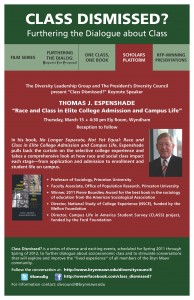On Wednesday, March 14, a group of 40 Bryn Mawr alumnae/i and students went to a performance of the award-winning play Clybourne Park. Following the performance, the group participated in a private “talk back” with actors from the show and the show’s artistic director Terry Nolan.
This event is the third collaboration between the Alumnae Association and the Diversity Leadership Group around the yearlong “Class Dismissed?” initiative.
“Class Dismissed?” was launched last summer with the gift of the book Class Matters from the Alumnae Association to the incoming freshman. In February, Graduate School of Social Work and Social Research Professor Raymond Albert led a discussion in Philadelphia about Class Matters with a diverse group of undergraduate and graduate alumnae/i spanning many generations—from the class of 1948 through 2011.
Two of those attending the Clybourne Park event (an alumnus and a current student) volunteered to share their reflections about the performance and evening on the Class Dismissed blog.
A few weeks ago, I took a detour and drove past the Lower Merion property where my family moved approximately twenty-five years ago. The house that stood for many years on this land is no more; it has been carefully taken apart stone by stone. In its stead, a new house will spring forward. Although I have not stepped foot in our previous residence for many years, it was difficult not to feel melancholic or wistful. The physical structure no longer exists, but the memories and meanings ascribed to it remain. A house is not just four walls and a roof. It serves as a container for the hopes, dreams, fears, and secrets of its owners- past, present, and future. In our society, home ownership is a sign that a person has “made it”. And one of the most emotionally charged results of the recent economic downturn has been the epidemic of foreclosures that has plagued many families. In watching Bruce Norris’ brilliant, thought-provoking, and scathingly funny new play Clybourne Park with Bryn Mawr alumnae and students, I could not help but contemplate how our own private spaces can be impacted by issues of class and race.
In both acts of the play, characters remark that people need to live in houses, not principles. That said, Norris challenges us to consider that our choices about where and how we live say a lot about our principles. My parents grew up in working class environments in Buffalo, NY. Through hard work, determination, and many sacrifices, they were able to provide their three children with an upbringing vastly different from their own. This included first-rate private educations and a spacious residence. But a shift in geography did not necessarily translate into other changes. As a young man, despite the fact that I shared neighborhoods and a school with my classmates, I felt oddly out of sorts, as if there was some chasm of difference that was impossible to bridge. I was raised with a different set of values informed by my family’s roots in western New York. Those values are not necessarily better or worse than others, just different. Houses can offer new opportunities for better lives for some, but when we relocate, we bring ourselves along for the ride. Our principles and perspectives of the world persist. We cannot escape the confines of race and class by simply changing our address. Norris compels his audience to confront the idealistic notions of change that at times undergirds our discussions about race and class. Even with the passage of time, some elements of our identities remain resistant to modification. Our discussions of race and class must acknowledge that no matter where we move, we carry the past, present, and future along with us.
— John Edwards ’10 MSS
Growing up in a predominantly African-American neighborhood, there were certain things that I did not have to ever consider — such as how people would view the importance of things such as Black History Month or understand what it truly means to be able to attend an institution such as Bryn Mawr as an African American female. Being here has opened my eyes to how often people from different walks of life often have inaccurate thoughts about people different than themselves.
Since being on campus I have participated in a number of programs to encourage the discussion of issues of race and class on campus including the Social Justice Partnership Program and saw the outing to ‘Clybourne Park” as another opportunity to continue that discussion.
The bold dialogue of “Clybourne Park” gave me questions to bring back to Bryn Mawr. It leaves me to wonder what stereotypes still exist about ethnic groups, and what role class plays in people’s interactions with one another.The talk back was insightful because it gave me a chance to hear other attendees’ response to this satirical play. It was interesting that some attendees found humor in the work, while others were more critical because they felt the play was not a true depiction of interactions between whites and blacks. They offered the idea that white people do not have to deal with feeling unwanted by black people, and it caused me to consider the validity of this assertion.
After reflecting on the play I feel that racism can be a two way street, and I loved that the director of the play Edward Sobel said that playwright Bruce Norris leaves no character innocent throughout the work. In “Clybourne Park” both black and white characters had opinions of the other race, that were ignorant and insensitive. Norris’ skill as a writer is displayed in the fact that every character has their good and bad qualities, and that everyone has their own personal conflict with race relations.
–Lauren Footman ’14



